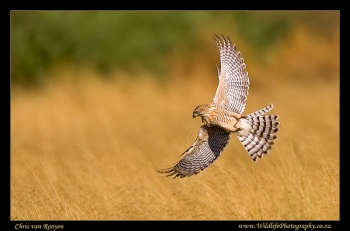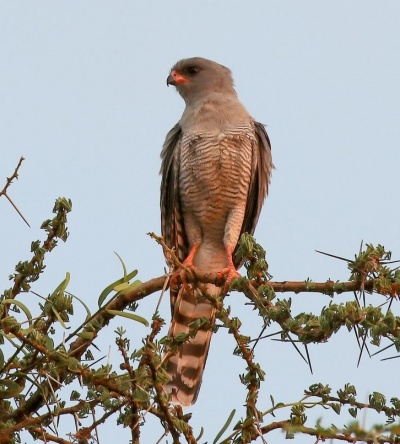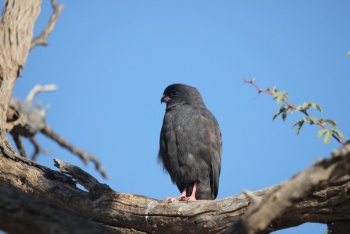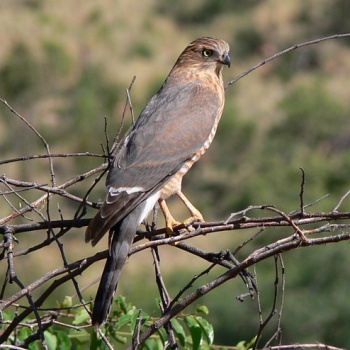- Micronisus gabar
Melierax gabar
Identification
28–36 cm (11-14¼ in); female larger than male
- Broad white rump
- Grey upper breast
- Secondaries have white edges
- Yellow legs in juveniles, red legs in adults
Melanistic birds have red legs and strongly barred wings and tails, but no white edges on secondaries
Similar Species
They look like a small Pale Chanting Goshawk. The melanistic morph is similar to a melanistic Ovambo Sparrowhawk.
Distribution

Kgalagadi Transfrontier Park, formed from the old Kalahari Gemsbok National Park of SA and the Gemsbok National Park of Botswana, 10 April 2007
Sub-Saharan Africa: widespread but discontinuous range breeding in Senegal, in Mali, Burkina Faso and Ghana, and from south Niger and north Nigeria east to Ethiopia and west Somalia. Range extends south through eastern Africa to eastern Angola, Namibia and South Africa. Probaly also breeds in Yemen and south-west Saudi Arabia.
Resident in some parts of range, a short-distance migrant in others. Common in many parts of range.
Taxonomy
Some authorities use place this species in genus Melierax.
Subspecies
Three subspecies are recognised[1]:
- M.g. gabar in southern Africa, (Southern Angola to Zambia, Mozambique and South Africa)
- M.g. aequatorius in Central Africa (Highlands of Ethiopia to Zaire, Zambia and northern Mozambique)
- M.g. niger from Senegambia to Sudan, northern Ethiopia and south-western Arabia
Habitat
Open woodland, grassland with scattered trees and scrubland, Acacia thornbush and Brachystegia woodland.
Behaviour
A small swift hawk. Generally found singly or in pairs.
Diet
They hunt by darting out from a tree in fast dashes. They catch small birds in flight or trap them in dense vegetation. Prey species range from young Helmeted Guineafowl, francolins and coucals.
Movements
Resident in some parts of range, a short-distance migrant in others. Common in many parts of range.
References
- Clements, J. F., P. C. Rasmussen, T. S. Schulenberg, M. J. Iliff, T. A. Fredericks, J. A. Gerbracht, D. Lepage, A. Spencer, S. M. Billerman, B. L. Sullivan, and C. L. Wood. 2023. The eBird/Clements checklist of Birds of the World: v2023. Downloaded from https://www.birds.cornell.edu/clementschecklist/download/
- Avibirds
- Handbook of the Birds of the World Alive (retrieved Jan 2018)
Recommended Citation
- BirdForum Opus contributors. (2024) Gabar Goshawk. In: BirdForum, the forum for wild birds and birding. Retrieved 27 July 2024 from https://www.birdforum.net/opus/Gabar_Goshawk
External Links
GSearch checked for 2020 platform.1






